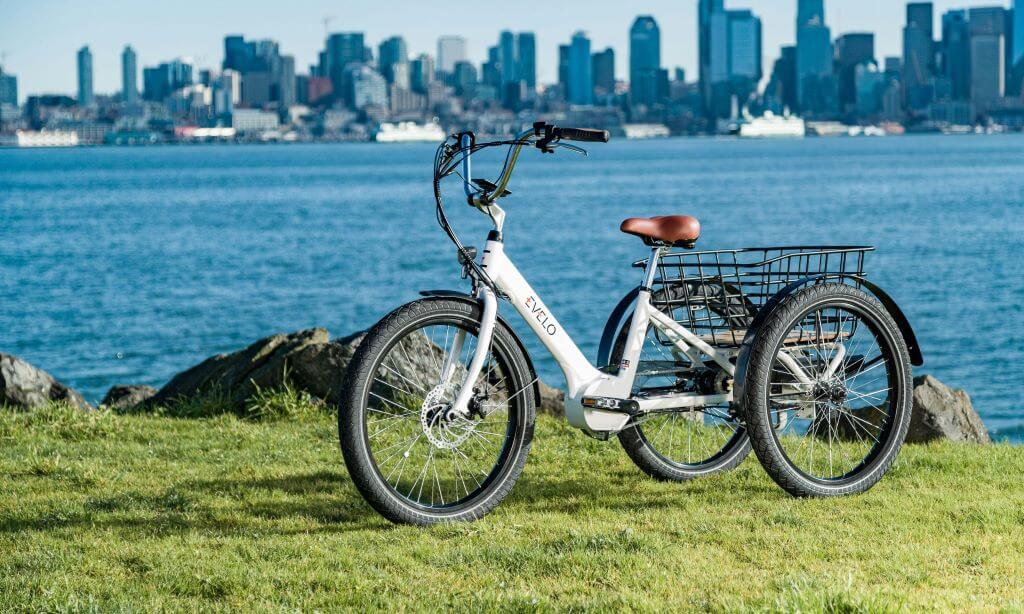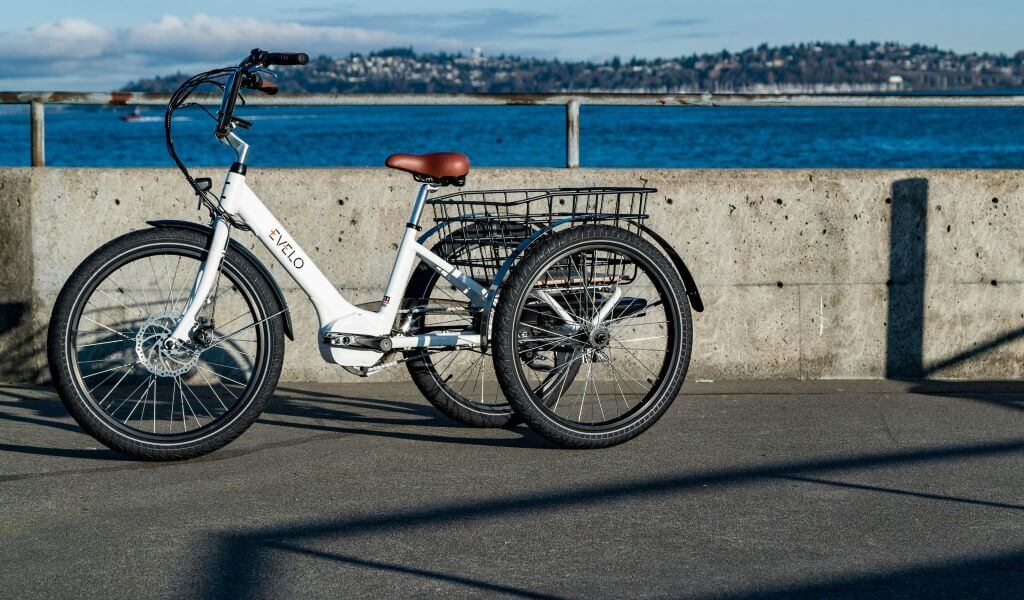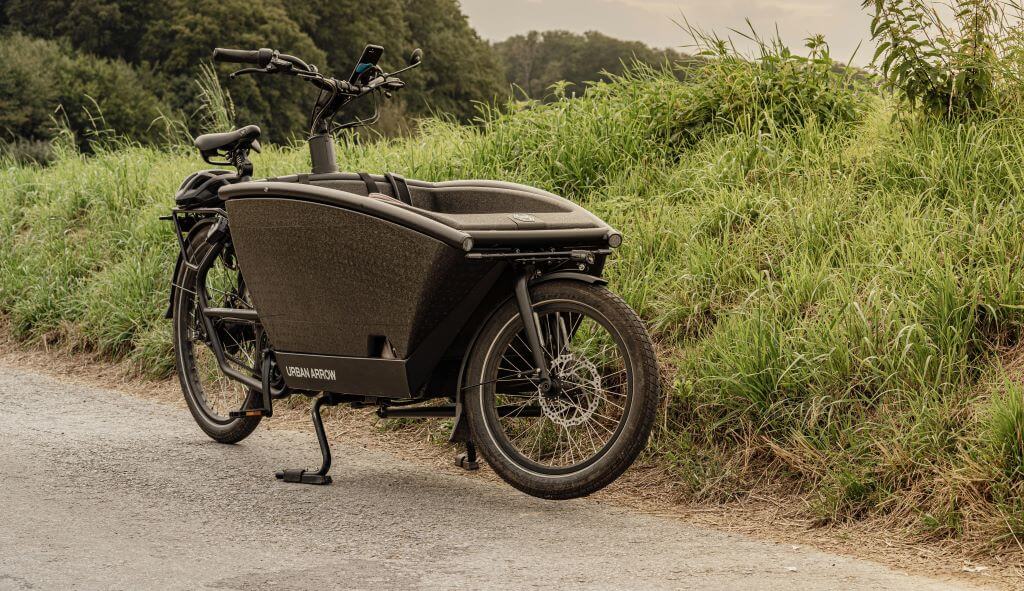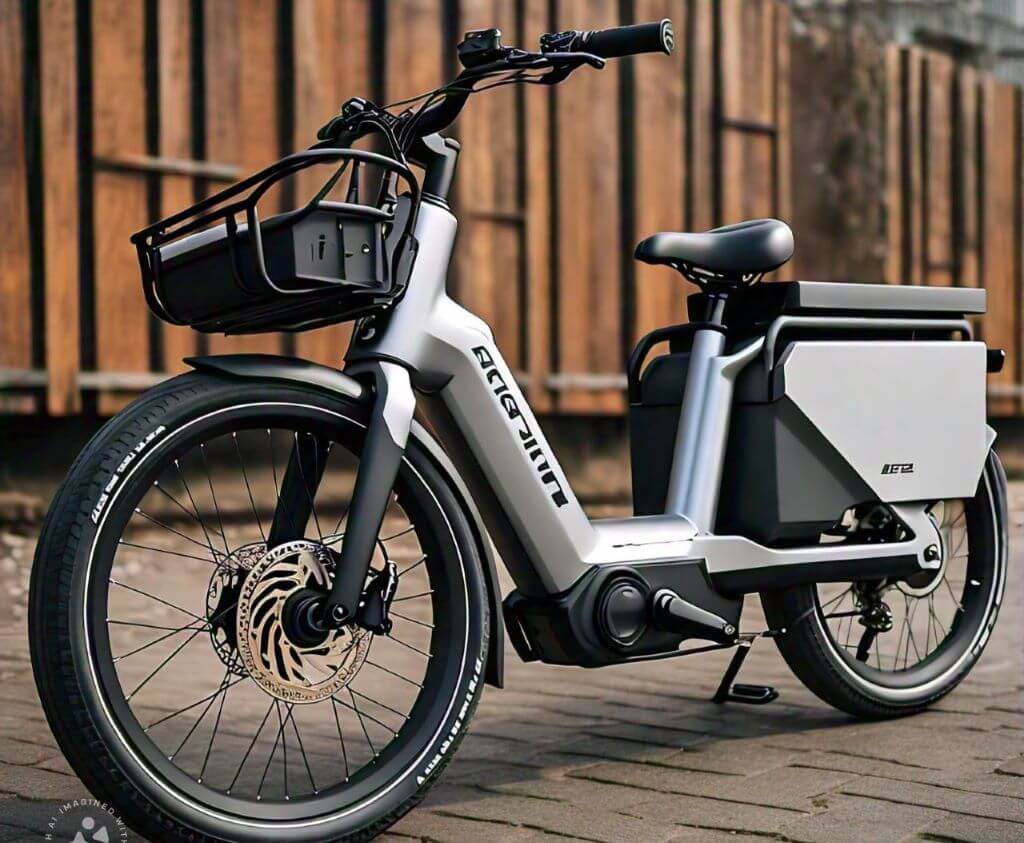What is a Cargo eBike?
The Cargo eBike is an electric bicycle designed to carry heavy loads, providing an eco-friendly and practical alternative to cars and vans. Equipped with a powerful motor and a large cargo area, this bike is perfect for errands ranging from grocery shopping and school runs to commercial deliveries. With different styles like longtail, front-loader, and tricycle models, ebike cargo provide convenience for urban dwellers and businesses.
The continued rise in popularity of cargo ebikes reduces urban traffic congestion and carbon emissions, making them an essential part of sustainable transportation solutions for the future. Electric cargo bikes offer an efficient, cost-effective way to move goods and people for personal or business use.

Different Types of Cargo eBikes
Longtail Cargo eBikes
- Longtail cargo ebikes are a type of electric bicycle designed with an extended rear rack, which allows for more cargo capacity. These ebikes are ideal for transporting children, groceries, or other heavy items.
- The extended frame provides stability even when carrying large loads, while the electric motor assists, making it easy to pedal uphill or cover long distances.
- Longtail ebike cargo often come with additional features such as footrests, side loaders, and customizable racks, enabling users to adapt the bike to their specific needs.
- The bike is popular with families and small businesses, offering a practical, eco-friendly alternative to the car for short commutes and daily errands. Their balance of stability and maneuverability makes them a versatile choice for urban transportation.
Tricycle Cargo eBikes

- Tricycle cargo ebikes are designed with three wheels, offering greater stability and larger cargo capacity compared to two-wheeled models.
- These e-bikes usually have large cargo boxes on the back or front, making them ideal for transporting heavy and bulky items such as large deliveries or multiple children.
- The design of the tricycle electric cargo bike provides a stable platform, reducing the risk of tipping even when fully loaded. This makes them a popular choice for businesses, especially in urban areas where deliveries need to be made efficiently.
- The electric motor in tricycle cargo ebikes helps control the extra weight, ensuring a smooth ride even on steep terrain. Tricycle ebike cargo is especially useful for people who need extra stability and capacity in their daily transportation.
Compact Cargo eBikes
- Compact cargo ebikes are designed for people who need the utility of a cargo bike but prefer a smaller, more compact frame.
- These ebikes typically have short wheelbases and small cargo areas, making them easy to navigate in crowded urban environments and store in tight spaces.
- Despite their small size, compact electric cargo bikes can carry significant loads, such as groceries, small parcels, or even a child. They are ideal for city dwellers who need a practical, eco-friendly alternative to a car for short trips and daily errands.
- The electric motor in a compact ebike cargo provides enough power to help with heavy loads, making these ebikes a convenient option for those looking for a balance between cargo capacity and maneuverability.
Modular Cargo eBikes
- Modular cargo ebikes are highly customizable electric bikes that allow users to adapt the bike to their specific needs.
- These e-bikes have a flexible design, with interchangeable parts and accessories, such as cargo racks, baskets, seats, and child carriers, as needed. This adaptability makes them suitable for a wide range of uses, from family transport to commercial deliveries.
- The modular design allows users to easily switch between configurations, making the bike versatile for a variety of tasks. For example, a user can install a large cargo box for deliveries during the week and switch to child seats for weekend family outings.
- The electric motor ensures that the bike remains easy to ride, even when carrying heavy or awkwardly shaped loads, making modular ebike cargo a great choice for those looking for flexibility.
Long John (Front Loader) Cargo eBikes

- Long John cargo ebikes, also known as front loaders, have a large cargo area between the handlebars and the front wheel. This design allows for excellent balance and visibility when carrying large loads such as children, groceries, or heavy objects.
- A low center of gravity ensures stability, even when the cargo area is fully loaded. These ebikes are typically used for family transportation, where parents can keep an eye on their children while riding, or for businesses that need to transport goods efficiently in urban settings.
- The electric motor provides extra power, making it easier to handle heavy loads and navigate city traffic, making Long John ebikes a versatile and practical option for a variety of needs.
Key Features and Components
Electric Motor
- Electric motors in cargo ebikes come in two main types: mid-drive and hub motors.
- Mid-drive motors are located on the bike’s crankshaft, providing better weight distribution and efficiency, especially on hills. They provide a natural riding experience and are ideal for heavy loads.
- On the other hand, hub motors are integrated into the wheel hub (front or rear), offering smooth and quiet operation. They are generally more affordable but can affect handling due to their weight distribution.
- The choice of electric motors in electric cargo bikes depends on terrain, load requirements, and personal preferences.
- The power and performance of the electric motor in a cargo ebike are crucial for handling heavy loads and navigating various terrains. Motor power is usually measured in watts with common options ranging from 250W to 750W or more. Higher wattage gives better acceleration and hill climbing ability, which is essential for carrying cargo.
Battery Systems
- The capacity of the battery in a cargo eBike, measured in watt-hours (Wh), directly affects range – the distance the eBike can travel on a single charge.
- High-capacity batteries provide a long range from 500Wh to 1000Wh, which is essential for long journeys or carrying heavy loads.
- The range may vary depending on factors such as terrain, rider weight, and the level of support used. The high-capacity battery ensures that the eBike can cover significant distances without frequent recharging, making it more reliable for everyday use, especially for businesses or families that require consistent performance.
- Battery charging time and lifespan are important considerations for ebike cargo. Charging time may vary depending on battery size and charger type, typically 3 to 6 hours. Faster charging options are available but they can reduce overall battery life.

Frame Design and Material
- The frame design and materials of the cargo ebike are important to ensure strength and durability. Common materials include aluminum, steel, and sometimes carbon fiber.
- Aluminum frames offer a balance of strength and lightweight qualities, making them popular for ebike cargo. A steel frame is heavier but offers more durability and comfort, absorbing road vibrations better.
- The frame design, including reinforced joints and load-bearing sections, ensures that the eBike can handle the stress of carrying heavy cargo without compromising safety or longevity, making it suitable for a variety of demanding applications.
Cargo Capacity and Configurations
- Cargo ebikes are designed to carry considerable weight, but each model has specific load limits that users should consider.
- Load limits usually range from 100 to 250 kilograms depending on the design of the bike and the strength of the frame. Exceeding this limit can affect the bike’s handling, braking, and overall safety.
- Customizable cargo options on ebikes increase their versatility, allowing users to adapt the bike to specific needs.
- These options include interchangeable racks, baskets, panniers, and cargo boxes, designed to carry a variety of loads, from groceries and packages to children and pets.
- Some ebike cargoes also offer modular systems where components can be easily swapped or adjusted depending on the type of load.
Braking and Suspension Systems
- The braking and suspension systems of cargo ebikes are critical for handling heavy loads. Braking systems, usually hydraulic or mechanical disc brakes, provide reliable stopping power.
- Advanced suspension systems, such as front and rear shocks, absorb road impact, ensure a smooth ride, and reduce the risk of accidents.
- These features work together to maintain control and stability, especially on uneven terrain or during sudden stops, making the eBike safer for both rider and cargo.
Additional Features
- Lighting and visibility are critical safety features on cargo ebikes. Front and rear lights with LED technology increase the visibility of the rider to other people on the road.
- Reflective elements on the bike frame or accessories further improve visibility. Some ebikes come with brake-activated lights for added safety.
- Security systems on ebike cargo, including locks and alarms, are essential to protect the bike and its cargo. High-quality locks, such as U-locks or chain locks, prevent theft by securing the bike to immovable objects.
- Connectivity features like GPS and smartphone integration enhance the functionality of cargo ebikes. GPS tracking helps with navigation, route planning, and theft recovery, making it easier for riders to manage their trips and secure their bikes.
- Alarms can deter thieves by emitting loud noises if tampered with. Some advanced models feature GPS tracking to locate the bike if it is stolen. These safety measures are especially important for ebike cargo, which is often valuable and may carry expensive or important items.
- Smartphone integration allows users to monitor battery life, track distance, and control settings through dedicated apps.
- Some ebikes also offer real-time updates on traffic or weather conditions. These connected features provide convenience and added security.
Benefits of Using a Cargo eBike
- Cargo ebikes significantly reduce carbon emissions by replacing car trips with clean, electric-powered transportation. This shift helps reduce greenhouse gas emissions, contributes to a healthier environment, and combats climate change.
- As cities strive for sustainable urban mobility, cargo ebikes offer a practical, eco-friendly alternative, reducing the carbon footprint of daily commutes and deliveries. Their widespread adoption can play a crucial role in reducing overall air pollution and sustaining the greenness of the city.
- Cargo ebikes help reduce traffic congestion by taking up less space on the road compared to cars and trucks. Their compact design and maneuverability allow them to navigate congested urban areas more efficiently, reducing the number of vehicles that contribute to traffic jams.
- Cargo ebikes offer significant cost savings compared to conventional vehicles. They do not require fuel, instead relying on rechargeable batteries, which are cheap to run.
- Cargo ebikes also have lower maintenance costs, as ebikes have less complex components than cars or vans, resulting in less frequent repairs. This makes cargo ebikes an economical choice for individuals and businesses who want to reduce transportation costs and still enjoy the convenience of motorized transport.
- Riding a cargo ebike improves physical fitness and health. Even with electric assistance, pedaling helps improve cardiovascular health, muscle strength and overall endurance. This regular exercise can lead to weight management, reduced stress levels and a more active lifestyle.
Future Trends in Cargo eBikes
- Future advancements in battery and motor technology will increase the efficiency, range, and power of cargo ebikes. Expect longer-lasting batteries with faster charging times and motors that provide smoother, more powerful assistance.
- Cargo ebikes are increasingly incorporating smart features and IoT integration, offering riders real-time data, GPS tracking, and connectivity with smartphones. These features enhance safety, route planning and maintenance, allowing for a more personalized riding experience. IoT integration also enables remote diagnostics and software updates, keeping the eBike in optimal condition and improving user convenience.
- With advancements in technology, improved infrastructure, and growing awareness, cargo ebikes are poised to become a common mode of transport in urban areas. Cargo ebikes are gaining mainstream traction as more people recognize their practicality and environmental benefits.
- Governments are increasingly offering incentives and subsidies to encourage the adoption of cargo e-bikes. This could include tax breaks, rebates, and grants for purchasing e-bikes, as well as investment in cycling infrastructure.
- Cargo ebike sharing services are emerging as a viable business model, offering flexible and eco-friendly transportation options for urban delivery and personal use. These services allow users to rent cargo ebikes on demand.
Maintenance Tips for Cargo eBikes
- Regular checkups are important for cargo e-bike maintenance. Check that tires, brakes, and all lights are working properly. Schedule professional servicing every few months to prevent problems from becoming serious.
- Always use the recommended charger, avoid overcharging, and store the battery at a moderate temperature to prevent damage, for the long life of the Cargo eBike. Check regularly for signs of wear and keep batteries clean and dry.
- Storing your Cargo eBike properly is critical to its longevity. Indoor storage is ideal, protecting the bike from harsh weather and potential theft. If outdoor storage is necessary, use a waterproof cover and lock the bike securely. Consider using additional security measures such as alarms or GPS trackers for added security.
Environmental Impact and Sustainability
- Cargo ebikes significantly reduce the carbon footprint compared to conventional vehicles. Unlike cars and trucks, which rely on fossil fuels, cargo ebikes are powered by electricity, producing no direct emissions. This transition from gas-powered vehicles to e-bikes contributes to mitigating climate change by reducing greenhouse gas emissions.
- Cities are designing infrastructure like dedicated bike lanes and charging stations to accommodate these types of eco-friendly vehicles. This integration not only supports reduced dependence on fossil fuels but also helps reduce noise and air pollution. By adopting cargo ebikes, urban areas can foster healthier, more sustainable living environments.
- Solar charging stations are an innovative solution for making cargo ebikes sustainable. These stations use renewable energy from the sun, providing an environmentally friendly alternative to the traditional electric grid. By offering solar-powered charging options, cities and businesses can further reduce the environmental impact of eBikes.
Cargo eBike vs. Traditional Cargo Bikes:
- Cargo ebikes and traditional cargo bikes serve similar purposes but differ in key ways.
- Cargo ebikes are equipped with electric motors that assist in pedaling, making them easy to ride. It makes the ride smooth when carrying heavy loads or navigating hills. This motorized assistance allows faster speeds and longer ranges with less physical effort. Traditional cargo bikes are fully human-powered requiring physical exertion for pedalling.
- However, cargo ebikes are generally more expensive and require more maintenance due to their electrical components. On the other hand, traditional cargo bikes are fully powered, simple in design, and have a low initial cost. They are more environmentally friendly but demand more physical effort, especially over long distances or challenging terrain.
Frequently Asked Questions (FAQs)
The average range of a cargo ebike is usually between 30 and 60 miles per charge, depending on factors such as terrain, load weight, and battery capacity.
Cargo ebikes can typically carry 200 to 400 pounds, including the rider, depending on the design and manufacturer’s specifications.
Yes, cargo ebikes are suitable for hilly terrains. Their electric motors provide the power to handle steep roads with heavy loads.
Yes, cargo eBikes can be used in all weather like heavy rain or snow conditions.
Cargo ebikes offer a versatile, eco-friendly solution for urban transportation, capable of carrying heavy loads with ease. They combine the benefits of a traditional cargo bike with the added convenience of electric assistance, making them ideal for both personal and commercial use. As infrastructure improves and awareness grows, cargo eBikes are likely to become a staple in sustainable urban transportation. To support the growth of cargo eBikes, consider advocating for better cycling infrastructure, exploring local eBike incentives, and sharing information within your community.
